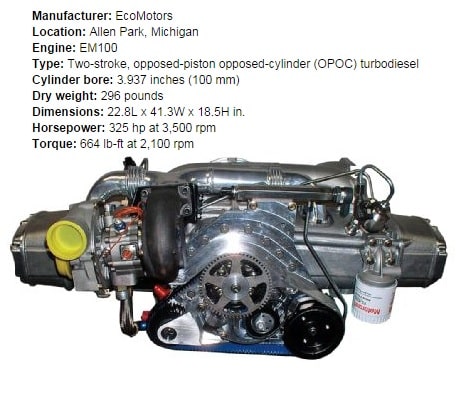Ecomotors Reinvents the Internal Combustion Engine
Table of contents
Table of contents

According to the National Venture Capital association, it is estimated that 40% of venture backed companies fail, 40% return moderate amounts of capital, and only 20% or less produce high returns. With over 460 active venture capital (VC) firms in the U.S. alone, only a small percentage end up being able to invest in companies that truly have disruptive potential. One company with a potentially disruptive product and strong backing and is Ecomotors.
About Ecomotors
Michigan-based Ecomotors was founded in 2008 by Professor Peter Hofbauer who first began working on opposed-piston opposed-cylinder (OPOC) engines in 2003. Mr. Hofbauer is a career innovator with over 50 patents relating to advanced powertrains, combustion technologies and control systems. He was responsible for the creation and development of the first Volkswagen diesel engine. Since inception, Ecomotors has taken in just over $58 million from Braemar Energy Ventures, Khosla Ventures, and even Bill Gates who made his first investment in Ecomotors in 2010. He even blogged about his investment here.
Update 09/27/2018: It appears that Ecomotors has gone bust.
OPOC Engines
The fuel economy of any engine is affected by friction, that is when metal engine parts are rubbing against each other at high speeds and over long periods of time. If you can reduce friction, you can dramatically improve the fuel economy of an engine. In all engines, there is a practical limit to piston speed above which engine performance begins to suffer from increasing friction. Piston speed is related to the distance the piston must travel. In an OPOC engine, each piston travels about half the distance of a piston in a conventional engine, and travels at about half the speed resulting in decreased friction and increased fuel economy as seen below:
In addition to reduced piston travel, the OPOC engine from Ecomotors has no cylinder heads, valvetrain components, or other mechanicals associated with conventional engines. As a result, the engine is much less complex and has just 50 percent of the parts found in today’s engines making it much cheaper to manufacture. Consequently, the engines are also lighter and smaller than traditional engines.
Opposed piston engines are not a new technology. They were first used during World War II in warships and planes but were considered too expensive and problematic for use in automobiles. Ecomotors claims to have solved many of these problems with their prototype model EM100, OPOC engine which produces 325 horsepower and 664 pounds-feet of torque, yet weighs only 296 pounds:
The power-to-weight ratio for this engine is around 1.1 horsepower per pound and it only displaces around 2.5 liters. This is about half the space required for a typical stock V8 engine that might produce around the same amount of horsepower. After all the refinements made by Ecomotors, their OPOC engine is designed to be 15 to 45 percent more efficient, smaller, lighter, and less expensive to manufacture than conventional internal combustion engines. Ecomotors expects to be selling their diesel-powered engines in 2015 with an estimated annual production capacity of 100,000 to 150,000 after breaking ground on a $200 million plant this year in China. High-volume production is expected to begin this year and at capacity, the plant will have over US $1 billion in yearly revenue potential.
Conclusion
With Ecomotors moving from prototype to high volume production, it will be interesting to see which type of vehicles these opoc engines may start popping up in.
Sign up to our newsletter to get more of our great research delivered straight to your inbox!
Nanalyze Weekly includes useful insights written by our team of underpaid MBAs, research on new disruptive technology stocks flying under the radar, and summaries of our recent research. Always 100% free.


















Does this motor have an SAE mounting pad so that hydrostatic pumps can be mounted directly to the engine and does it have a governor? What is the cost?
Sounds like a great engine for towing with all of that torque!
What is the ‘stroke’ of this engine and should it not be called an engine rather than a ‘motor’ ?
It looks good, I think it could be quite an advancement in the automotive industry. I wonder about the cost, as other so called cost saving ideas usually are subsidized by uncle sam.
I think it would be better to give it to US jobs without a union, in a plant in Detroit.